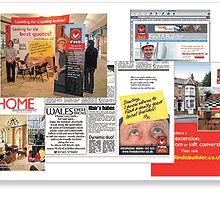Before You Buy
You've found the perfect home, it just needs one or two cosmetic changes that won't cost much, or will they? Phil Spencer, presenter of Channel 4's Location, Location and MD of Garrington Home Finders gives you his top tips for a successful search.
Sort out finance
You need to know how much you can borrow before you know how much you can spend. Get a mortgage offer in principle, in writing. Find a solicitor.
Organise requirements
Write a search brief, listing your 'must haves' - number of bedrooms,
bathrooms, garden size, parking. Some 'nice to haves' - stripped floors,
kitchen appliances included, separate laundry area, original features, no
chain, freehold, long lease. Most important make a list of real No-nos that
will cost a lot to change - such as a downstairs bathroom, short lease,
stone cladding, out-of-keeping replacement windows, artex walls. Be
specific. This will keep you focused.
Get on your bike!
Visit three or four estate agents in each possible district. Explain
you're on a search mission. Tell them your budget, space requirements, where
you work, school requirements, your leisure pursuits. Make a decision about
where to concentrate.
Prepare a 'buyer's pack'
Formally register with the agents in the chosen area. Include the mortgage letter, bank evidence about your deposit and your solicitor's address, to show you're serious.
Keep in touch
Don't wait for prettily laid-out details to arrive or agents to phone.
Make weekly calls to find out about new instructions and quiz the agent to
ensure the property fits your Search Brief. Don't be late for viewings and
don't upset vendors or agents - you need them!
Take notes
At the property, do a quick once-through‚ getting a sense of layout/size, then survey it slowly, considering how rooms might be changed. Remember, house position and the light it receives cannot be changed.
Spot pitfalls
Look upwards. Don't get carried away with a beautiful interior; scan the
guttering and roof for problem signs and ask when the exterior was painted.
Look for signs of damp and cracks in walls/ceilings. Does the owner have
current damp-proof/wood treatment certificates?
Are there enough power points? Does the visible wiring look okay?
Add up running costs
Ask how much service bills come to, to get an idea of expenditure. If windows are in a bad condition, or insulation poor, energy bills will be high until they are upgraded.
Have a survey
If you are in any doubt, a professional survey will highlight potential problem areas and save you money in the long run. In Scotland, where a sealed bid system contracts the purchaser immediately the offer has been accepted, surveys should be done before making an offer. In the rest of the UK, surveys are usually carried out after the offer is accepted and are currently the responsibility of the purchaser, However, the planned introduction of a "Seller's Pack" to speed house sales in England and Wales will put the onus for surveys on the seller.









